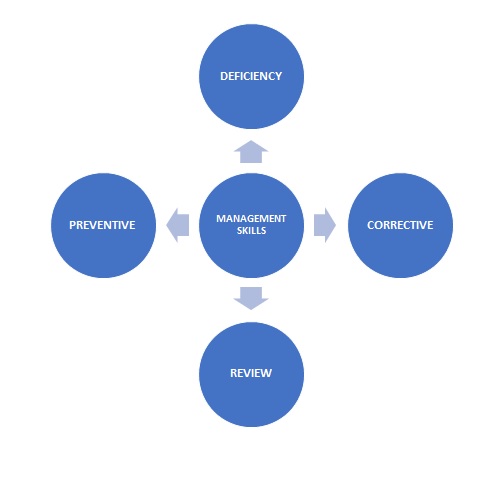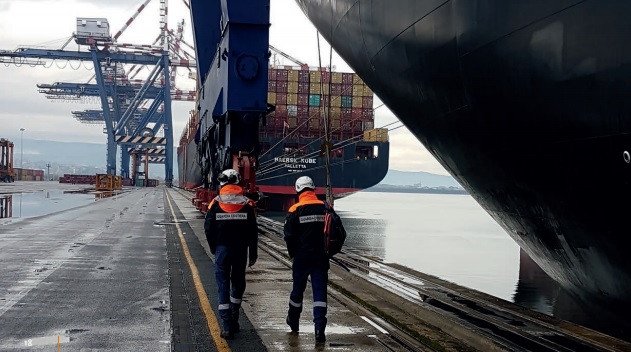Louis Kotronaros, Deputy DPA / Corporate Training Officer, ANGELAKOS HELLAS S.A., suggests starting thinking out of the box for PSC preparation and focus on interpersonal skills to keep things running as normal during a PSC inspection. In any case, the PSC inspections are carried out by people who need to be confident that the ship and crew have the skills to overcome problems and find solutions. Focus on management skills and professional behavior both ashore and onboard, can help work to be done effectively.
It has been more than twenty years that the Port State Control regime is having a strong impact to the shipping industry shaping the global fleet’s performance and creating a history profile for each single vessel.
The aim of the Port State Control is to eliminate substandard shipping practices and promote international regulations. Considering that the Port States exist in the lack of commercial relationships with ship operators, some people would say that they have the advantage to carry out objective inspections and identify weaknesses that would improve safety and environmental protection performance.
Today, after twenty years of having the PSC Officers carrying out inspections, you would have definitely heard people say that PSC inspections are not as objective as anticipated and having exaggerated judgement on minor items with no effect to the ships safety or environment protection.
The big concern with PSC inspection results is that they are being used by the industry as rough numbers compromising ships’ business reputation in the market.
Overall though, if you take a closer look at the annual reports of the MOU’s, you will find out that the areas of Navigation, LSA, FFE are the most popular ones with the biggest percentages in deficiencies. Wouldn’t you agree, according to your own experience, that those are the ones you deal with more often than any other area? Yes, we have come in terms with the PSC reality but we also need to defend our ships against PSC inspections and avoid undesired consequences.
Information Technology, which the MOU’s are using more effectively year by year, is a tool where more people is starting to use as to what to expect from a PSC inspection at a specific port or terminal. Visit the MOU website and you can obtain information specific to your vessel, inspection target, inspection window range and deficiency codes imposed at a dedicated port. You put all that together among with the PSC checklist, your ship’s needs and you have a decent preparation for a PSC inspection. Some even build their own databases where they can sort – who imposed what – on which vessel – on what date. The latest “cutting edge” service that information technology allows us to have is predictive analytics.
Do we really need though to exercise all that so we can prepare the ship effectively for an imminent inspection? Yes, we do! But when applying the “dodging the bullet” tactic by trying to guess what to expect from an inspection or a PSC Officer, at the same time you need to “build an armor” and gain some confidence and perspective to what is important. In other words, set priorities and focus on that. It may look as simple as it sounds, but in real life is not so easy. Lots of training, seminars, booklets, preparation guides and other stuff going around in the industry where it can help you get some insight how to get organized.
Now that you have done everything available in the industry, maybe you have a clear PSC report. Or maybe, you need to clear out all the deficiencies so the ship is allowed to make the departure on time.
The scoreboard based on my experience either way is: Interpersonal skills – 1 / Predictive analytics – 0
Sort out your PSC data and I’m sure you will come to the conclusion where more than 30% of your fleet’s deficiencies are not reflecting to non-conformances against SOLAS, MARPOL or any other convention. Even if they do, most of the times crew has the time to rectify defects and deficiencies before the close out of the inspection.
PSC inspections are carried out by people who need to be confident that the ship and crew have the skills to overcome problems and find solutions.
There is a point where the communication skills of the crew jump in or rather should jump in and obtain the best result on the PSC inspection report.
What is there, lying behind the “communication skills” that we can extract and utilize so we can improve that skill to the maximum? Do we search for crew that has a natural talent for communication? Do we make training?
If you have experience with management systems, I’m sure that you will agree with me; the human resources area is mostly engaged with continuous training. There are trainings and seminars fit to the maritime industry where someone can learn a bit of something more. I think that almost everyone has been in a “PSC inspection management” training course.
Let’s take a moment and think out of the box. What is like a PSC preparation day? I think it is one more day just like the others. Checking the list of things, you have planned to do for the day.
In reality you know it isn’t like that. Having in mind that there is an imminent inspection upon arrival, makes everybody restless and try to shape up the ship. That is a good thing. But having an imminent inspection as a motive to keep things sharp…..that is not a good thing!
Put the work outside, life in the sea alone is tough and management skills is the answer to keep things running as normal.
So, I say training, but training “outside the box” for both shore and ashore staff. I think we need to re-invent the corrective-preventive loop and incorporate that “interpersonal skill” that will allow, let’s say a failure, to touch the surface where the corrective action would have a more direct impact to the source of the problem and not just spend time to close out the outstandings to the satisfaction of third parties.

We need to have the crew to learn management skills and professional behavior so
- they are able to assess and prioritize work that needs to be done,
- communicate to third parties the ship’s priorities and demonstrate “a” solution to the problem.
It is very important that the Company will commit to set that direction and create a corporate environment where the crew feels confident to act by having clear directions, room for initiative and support if the undesired outcome is produced.
I always remember what a PSC officer of the Coast Guard told me once:
“It is not about how many problems you have. It is about how much in control of the problems you are. And believe me, a couple of deficiencies are the least of your problems”.
By Louis Kotronaros, Deputy DPA / Corporate Training Officer, ANGELAKOS HELLAS S.A.
The views presented hereabove are only those of the author and not necessarily those of SAFETY4SEA and are for information sharing and discussion purposes only.






























































